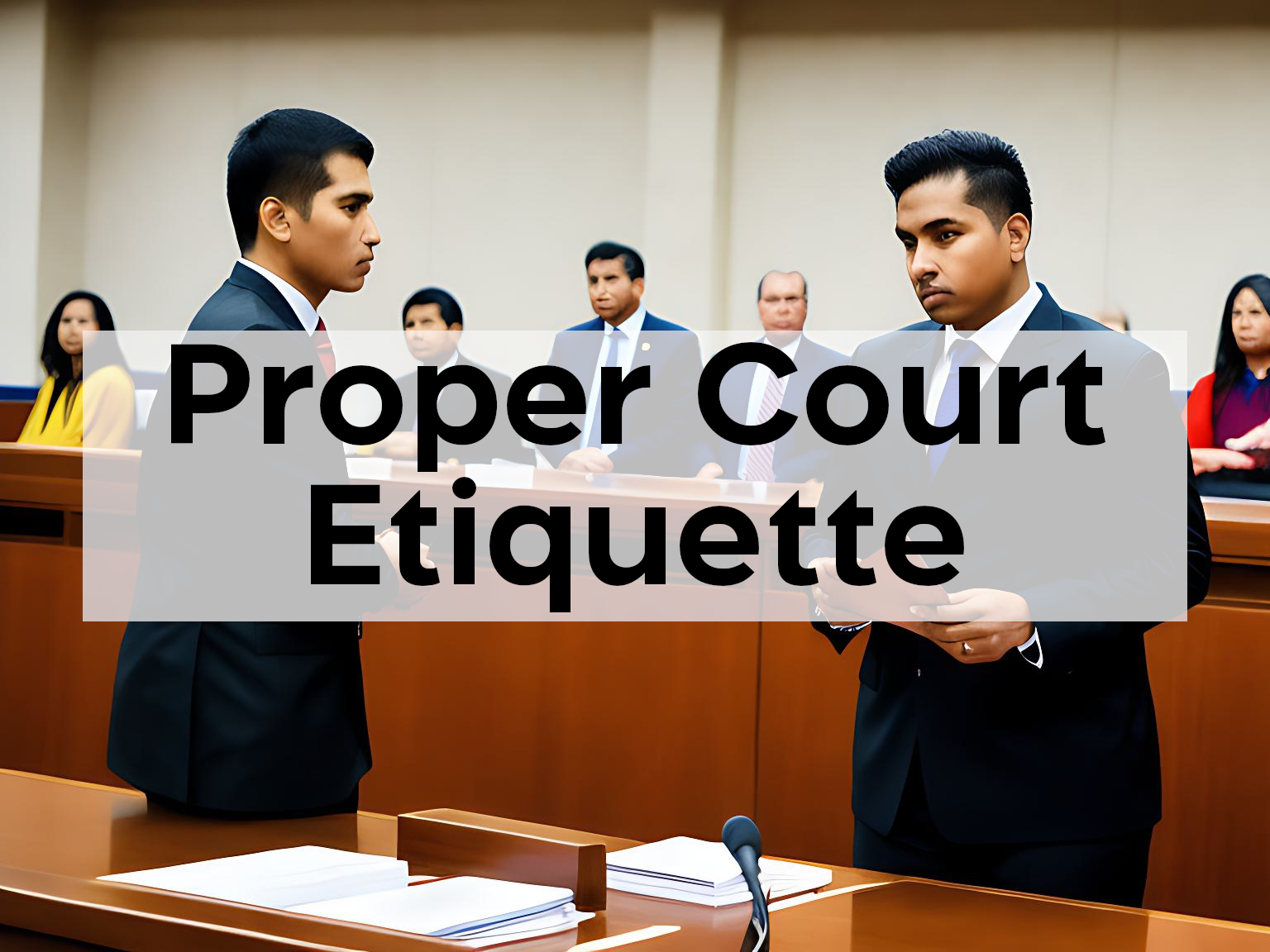DISCLAIMER: Altiorem Legal Services (hereinafter, “Altiorem”) cannot and does not provide legal advice. Altiorem is not a law firm; Altiorem’s staff are not attorneys, cannot act as attorneys, and do not act as attorneys; and any information provided by Altiorem in this article or otherwise is not a substitute for legal advice from an attorney. The information contained in this article should not be construed as legal advice, as it is not intended to be legal advice; the information in this article is provided for educational purposes only. Again, none of the information provided in this article should be construed as legal advice, and nobody should rely on or use the information contained in this article in their legal matters.
HOW TO PREPARE FOR COURT
The courtroom can be a very intimidating place, especially when a person is representing themselves—known as proceeding pro se (Latin “for oneself”).
It is important for a person to know proper court etiquette, including things such as what time to be at court, what to wear, and how to address the judge or commissioner.
Proper court etiquette is crucial to ensure a smooth and respectful experience. Here are some key aspects of courtroom etiquette to keep in mind:
- Punctuality: Arrive at the courthouse early to allow enough time to go through security, locate your courtroom, and mentally prepare yourself. Aim to be in the courtroom at least fifteen to thirty minutes before your scheduled appearance.
- Dress code: Dressing professionally and conservatively is essential. Business attire, such as suits or blazers, collared shirts, dress pants, skirts or dresses of an appropriate length, and closed-toe shoes, is recommended. Avoid casual clothing, like jeans, shorts, t-shirts, or sneakers, and ensure your appearance is neat and clean.
- Addressing the judge or commissioner: Always show respect when addressing the judge or commissioner. Stand when speaking to the judge or commissioner and refer to them as “Your Honor.” Make sure to speak clearly, politely, and concisely, avoiding slang, jargon, or disrespectful language.
- No interruptions: Wait for your turn to speak, and do not interrupt the judge or commissioner, opposing counsel, or witnesses. If you have an objection or a question, wait until the appropriate time to raise it.
- Cell phones and electronic devices: Most courtrooms have strict rules about the use of electronic devices. Turn off or silence your cell phone before entering the courtroom. In some cases, electronic devices may be prohibited altogether.
- Show respect to all parties: Treat everyone in the courtroom with courtesy and respect, including the opposing party, their attorney, court staff, and witnesses. Avoid making inappropriate faces, rolling your eyes, or displaying any aggressive or disrespectful body language.
- Be prepared: Familiarize yourself with the rules and procedures of the court, as well as the legal principles applicable to your case. Bring all necessary documents and evidence organized in a folder or binder. Be ready to present your case in a clear and concise manner.
- Maintain emotional composure: It is important to stay calm and collected during the court proceedings. Take deep breaths and try to maintain a level-headed demeanor, even if you feel emotional or upset about the case or court proceedings.
- Follow court rules: Different courts may have specific rules and procedures that you must follow. Research the rules of the specific court where your case will be heard and adhere to them.
By following proper courtroom etiquette, you will demonstrate respect for the court and its proceedings, which may positively impact the judge’s or commissioner’s perception of your case.
It is extremely important for a person not to miss their scheduled court hearing.
People who are representing themselves need to know when their court date is, what time it takes place, what judge or commissioner is presiding, and what courtroom the hearing is going to take place in. A good way to find out this information is either by looking at the scheduling order that is provided by the court or speaking with the court clerk.
Failing to attend a court hearing can have serious consequences, including the judge or commissioner ruling against you, the issuance of a bench warrant for your arrest, or fines and penalties. If you are representing yourself, it is your responsibility to be aware of all the necessary details regarding your court date.
Besides obtaining hearing information from the scheduling order or court clerk, one can take the following steps to ensure that the hearing goes smoothly:
- Court website: Many courts have websites where you can access information about your case. Look for an online case search or docket system and enter your case number or other identifying information. The website may also have information about the judge or commissioner assigned to your case, courtroom location, and any special rules or procedures.
- Written correspondence: Keep track of any written correspondence you receive from the court, as it may contain important details about your hearing. Make sure your contact information is up-to-date with the court to ensure you receive all relevant notifications.
- Attorney assistance: If you have an attorney, they can help you stay informed about the details of your hearing. Even if you are representing yourself, you may want to consult with an attorney or legal professional to review your case and help you navigate the legal process.
- Calendar reminders: Once you have confirmed the date and time of your hearing, mark it on your calendar and set reminders. Allow enough time to prepare for the hearing, gather necessary documents, and arrange for transportation to the courthouse.
- Court visits: If you are unsure about the location of your hearing, consider visiting the courthouse before your scheduled date to familiarize yourself with the building and locate the appropriate courtroom.
By staying informed about your court hearing and ensuring you have all the necessary details, you will be better prepared to represent yourself effectively in court.
A person should prepare for their hearing ahead of time; preparing for your hearing is essential to effectively represent yourself in court.
A well-organized case presentation can significantly impact the outcome. This includes gathering exhibits (evidence) and organizing them, having witnesses ready (if the person is planning on calling witnesses), and also having a brief outline of what the person wants to say.
Examples of exhibits include documents such as business records, bank statements, text messages, and photos.
A person should make four copies of each exhibit to give to the witness, judge or commissioner, the other party, and one for themselves.
Additional steps to prepare for a hearing include the following:
- Outline your presentation: As aforementioned, create a brief outline of your case, highlighting the main points you wish to address. This will help you stay focused and organized during the hearing. Adding to the foregoing, your outline should include the following elements:
- Introduction: Briefly introduce yourself, the nature of the case, and the issues to be resolved.
- Factual background: Present the facts of the case, supported by your exhibits and witness testimony.
- Legal arguments: Explain how the law supports your position, citing relevant statutes, case law, and/or regulations.
- Conclusion: Summarize your main points and request the specific relief or outcome you are seeking.
- Practice your presentation: Rehearse your case presentation to become more comfortable and confident with the material. This will help you maintain a clear, concise, and persuasive delivery in the courtroom.
- Familiarize yourself with court procedures: Research the rules and procedures for the specific court where your case will be heard. Understand the order of events, how to introduce exhibits, how to question witnesses, and how to make objections.
By thoroughly preparing for your hearing, you will be better equipped to present a compelling and organized case, increasing your chances of achieving a favorable outcome.
The courtroom is not a good place to bring children (unless they are testifying). Finding a babysitter is a necessity for this situation.
On the day of their hearing, a person should dress professionally. This means no jeans, no hoodies, and nothing with holes in it. They should dress like they are going to a very important job interview.
A person should try to arrive thirty minutes before their hearing in order to give them enough time to go through security, find their courtroom, and speak with witnesses, if necessary.
Your appearance and punctuality can influence the judge’s or commissioner’s perception of you and your case, as well as demonstrate your level of respect for the court.
Here are some additional details and tips to consider on the day of your hearing:
- Dress code: As aforementioned, dress as if you are attending an important job interview. For men, this typically includes a suit or dress pants with a collared shirt and tie, along with dress shoes. For women, options include a suit, a dress or skirt of an appropriate length, or dress pants with a blouse, as well as closed-toe shoes. Ensure your clothes are clean and well-fitted, and avoid flashy accessories or excessive jewelry. Avoid casual clothing, such as jeans, hoodies, t-shirts, shorts, or anything with holes or visible wear.
- Security screening: Be prepared to go through security when entering the courthouse. This may include walking through a metal detector and having your belongings screened. To expedite this process, avoid carrying any prohibited items, such as weapons or illegal substances, and minimize the number of personal belongings you bring to the courthouse.
- Locating the courtroom: Once you have cleared security, locate your assigned courtroom. Check the posted docket, ask the court clerk, or consult the courthouse directory to confirm the location. Familiarize yourself with the layout of the courtroom, noting the location of the judge or commissioner, witness stand, and any other relevant areas.
- Meeting with witnesses: If you have witnesses attending the hearing, use the time before the hearing to touch base with them, review their testimony, and address any questions or concerns they may have. Ensure they are also dressed appropriately and understand the court procedures.
- Mental preparation: Take a few moments to gather your thoughts, review your case outline, and practice deep breathing or other relaxation techniques to help calm your nerves. This will help you feel more composed and focused during the hearing.
By dressing professionally, arriving early, and taking the necessary steps to prepare for your hearing, you will be better equipped to represent yourself effectively in court and demonstrate respect for the judicial process.
DURING THE HEARING
Decorum
When entering the courtroom, it is important to have all cell phones and other electronics off or silent.
If there are other cases being heard that day, a person will have to wait until they are called by the judge or commissioner.
The Hearing Process
The party who instigated the hearing by filing court documents, such as a motion, is the first one to present their argument at the hearing. Then, the other side has an opportunity to respond and present their counterargument. Finally, the person who brought the action then speaks again and gets to make final remarks.
Respect for the Judge
The judge or commissioner is to be addressed as “Your Honor.”
Addressing the judge or commissioner as “Your Honor” is a sign of respect and professionalism in the courtroom. This formal title is used to show deference to the authority and position of the individual presiding over the court proceedings. When speaking to or referring to the judge or commissioner, always use “Your Honor” as the proper form of address.
For example, if you have a question or need clarification during the hearing, you might say, “Your Honor, may I ask a question?” or “Your Honor, could you please clarify the point you just made?”
It is crucial to maintain a polite and respectful tone throughout the court proceedings.
Speaking Clearly
In addition to addressing the judge or commissioner as “Your Honor,” remember to:
- Stand when speaking to the judge or commissioner unless instructed otherwise.
- Speak clearly and concisely, avoiding slang or informal language.
- Wait for your turn to speak, and do not interrupt the judge or commissioner, opposing counsel, or witnesses.
- Maintain a respectful demeanor, including appropriate body language and facial expressions.
By adhering to these guidelines, you can demonstrate respect for the court and its proceedings, which can positively impact the perception of the judge or commissioner regarding your case. If a person wants to enter an exhibit as evidence, they must ask the judge or commissioner if they can present it to the court and opposing party.
While it can be nerve-wracking, it is important to speak clearly and confidently to let the judge or commissioner know what happened and what is being asked of the judge or commissioner.
It is important to not interrupt when other people are talking.
One should speak clearly for the court reporter, give complete answers, make all answers and statements verbal for the court report, and speak up if something is confusing.
Sometimes, this is the only opportunity a person has to speak to the judge or commissioner. Be respectful. Again, do not make facial expressions (whether agreeing or disagreeing), and do not argue with the other party, witnesses, or the judge or commissioner.
Stay Calm and Reasonable
It is important to not get emotionally caught up in the case when presenting the case to the judge or commissioner.
A person should take notes as necessary and especially make notes if the judge or commissioner asks them to do something specific, such as submitting additional documents at a later date.
It is the job of the judge or commissioner to make a decision regarding the outcome of the case. Not everyone in the courtroom will agree with that decision, including the person representing themselves. In this instance, it is extremely important that that person does not argue with the judge or commissioner or lash out at the opposing party. There is usually an opportunity for an appeal, and any emotional outburst could be used against the losing party.
If the judge or commissioner does not make a decision that day, they will issue one in writing at a later date.
Pay Attention
Before court ends, both parties need to make sure they know if they need to come back for an additional hearing or if they need to submit additional documents to the court.
Most importantly, if a person representing themselves does not understand something said by the judge or commissioner or done in court, that person needs to ask the judge or commissioner.
Once court is over, the parties will not be able to speak to the judge or commissioner again unless through a motion or at another hearing date, so getting all questions answered when in front of the judge or commissioner is best.
It is important to know that neither party is allowed to record the hearing. A request can be made for a transcript of the hearing if a court reporter is present during the hearing or an audio recording of the hearing.
While court can be intimidating, people represent themselves in court every day.
Remembering that asking questions is okay as long as a person is respectful during the hearing can go a long way.
CONCLUSION
In conclusion, successfully representing oneself in court requires a thorough understanding of court etiquette, appropriate preparation, and effective communication.
To navigate the intimidating courtroom environment, it is essential to arrive early, dress professionally, address the judge or commissioner with respect, and maintain emotional composure.
By researching specific court procedures, organizing and rehearsing case presentations, and staying informed about hearing details, individuals can increase their chances of achieving a favorable outcome.
It is also important to follow court rules, treat all parties with respect, and seek clarification when needed.
It is important to remember that while self-representation in court can be challenging, it is possible to achieve success by doing things such as adhering to proper courtroom etiquette and diligently preparing for the hearing.
CONTACT US TODAY!
Do you need help with courtroom etiquette? Let Altiorem help you today with affordable, top-quality legal paralegal services.
Expertise. We are knowledgeable, skilled, and experienced in the process of courtroom proceedings and in drafting all manner of legal documents, such as briefs, pleadings, motions, memoranda, letters, contracts, etc. If you need a top-quality, professional, excellently written, well-researched, and compelling legal document drafted, then look no further!
Quality. We produce top-quality, properly written legal documents with impeccable grammar, punctuation, spelling, structure, flow, information, compelling legal arguments, and persuasive legal conclusions. You can see the quality of our work on our work samples page, where you can peruse and evaluate our writing, as well as our other blog posts.
Experience. Our paralegals are highly experienced in working with attorneys, other paralegals, and court personnel.
Customer Care. Navigating the Utah legal system can be daunting and confusing. Let Altiorem relieve your stress and be your guide. Altiorem has a team of professional paralegals ready to work for you. We want to give you the best chance at getting an outcome for your case that you will be happy with. We are happy to receive documents via email from you, speak with you on the phone, look through court files, or even translate documents (English / Spanish)!
Accessible. If you are interested in retaining our services, we can be contacted at (801) 855-6541 (text or call) and at altiorem@altioremlegalservices.com. If you have a project in mind that you would like us to work on, please click here to send us a project request and get a quote. Alternatively, you can send us an email detailing the work you need to be performed, and a real person will respond promptly.
Thank you for your attention and consideration.



